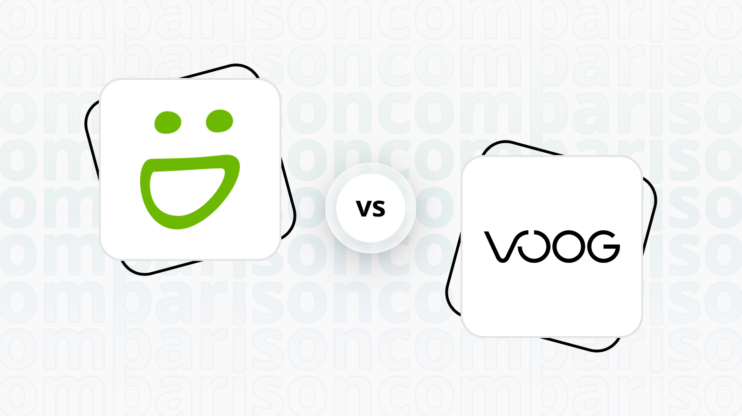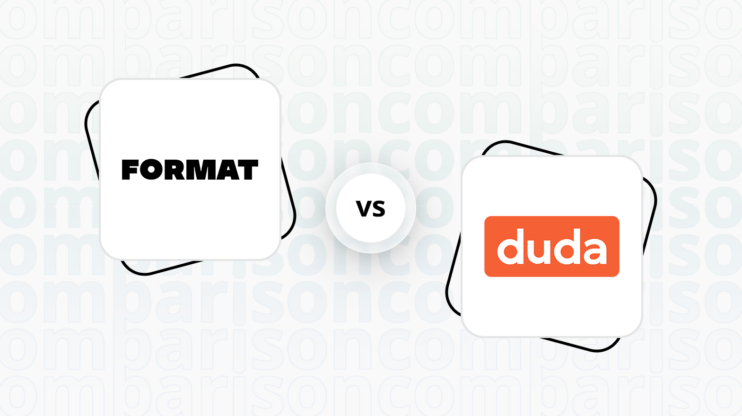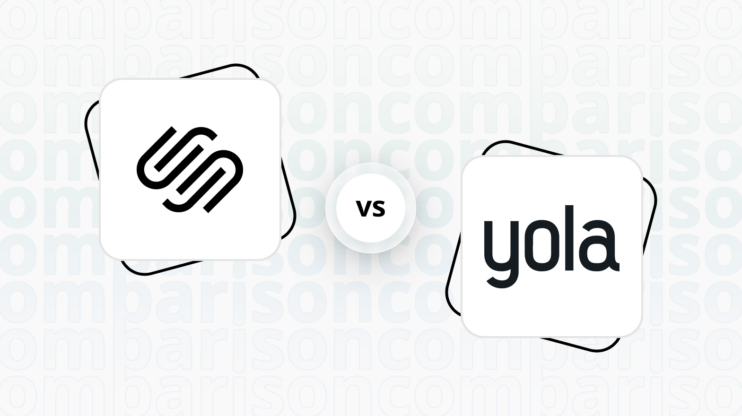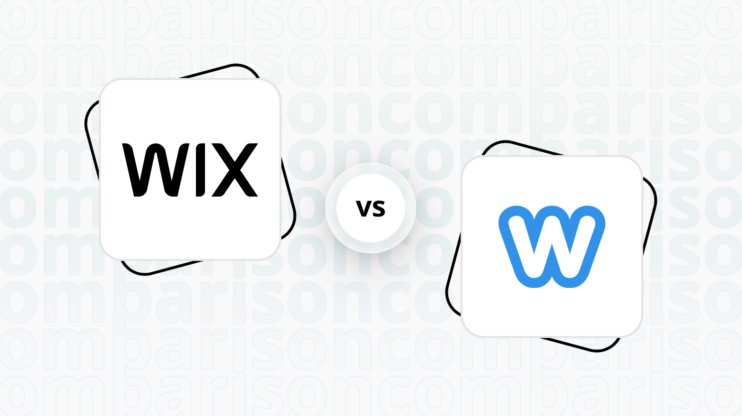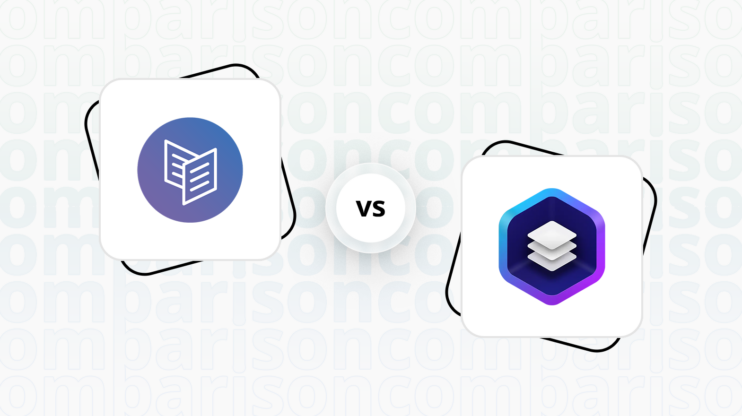Final verdict
Between Shopify and Web.com, Shopify emerges as the more robust and versatile platform, particularly for users focused on ecommerce.
-
Shopify (Overall Grade: 8.1/10)
excels with its comprehensive ecommerce features, superior design templates, and extensive app marketplace. It’s designed for businesses of all sizes looking to grow online, offering advanced tools for sales, marketing, and site management. Shopify’s ease of use, combined with powerful analytics and customer support, makes it a top choice for serious online merchants. -
Web.com (Overall Grade: 5.8/10)
provides a simpler solution aimed at those new to website building or with basic site needs. While it offers a range of templates and some ecommerce capabilities, it falls short in comparison to Shopify’s depth of features and customization options. Web.com is suited for users seeking an easy-to-use platform for smaller-scale projects.

|

|
|
|---|---|---|
| Design Functionalities & Templates |
8.2 |
6.4 |
| Ease of Use |
7.5 |
6.4 |
| Ecommerce |
9.2 |
6.3 |
| Website Editors |
7.9 |
6.6 |
| Product Testing Options |
8.1 |
0.2 |
| Price |
8.2 |
7.4 |
| Hosting Quality |
9.0 |
5.9 |
| Website Speed Optimization |
7.8 |
5.8 |
| Plugins and Integrations |
8.7 |
6.7 |
| Marketing Features |
8.8 |
7.0 |
| Customer Support |
8.6 |
7.3 |
| Security |
9.0 |
7.6 |
| AI Capabilities |
7.9 |
7.3 |
| User Management |
6.5 |
5.2 |
| Overall |
8.1 |
5.8 |
Best for ecommerce
 9.2
9.2
 6.3
6.3
Verdict
: Shopify is the superior choice for ecommerce, offering a robust platform designed for growth and scalability. Web.com, while suitable for basic ecommerce needs, lacks the depth of features and customization options provided by Shopify.
-
Shopify
: With a score of 9.2, Shopify stands out for its comprehensive ecommerce capabilities, including advanced inventory management, multi-channel selling, and detailed analytics. It’s designed for businesses aiming for growth and scalability in the online marketplace. -
Web.com
: Scoring 6.3, Web.com offers essential ecommerce features suitable for small businesses or those just starting out. However, it falls short in providing the depth of ecommerce functionality and customization that Shopify offers.
Best for informational & business websites
 6.8
6.8
 6.5
6.5
Verdict
: Shopify slightly edges out Web.com for informational business websites, primarily due to its superior design options, hosting quality, and extensive app ecosystem.
-
Shopify
: Known for its ecommerce capabilities, Shopify also serves well for informational sites, especially for businesses that might scale into online sales. Its higher score reflects a robust platform with professional templates and a comprehensive set of tools for website creation and management. -
Web.com
: While Web.com is slightly behind Shopify in score, it remains a competitive option for those prioritizing ease of use and mobile responsiveness. Its platform is tailored for users seeking straightforward website creation tools without the need for advanced ecommerce functionalities.
Detailed comparison
Design functionalities & templates
Design FunctionalitiesRepresents how well each platform allows for creative design and customization of websites.Score Components:
- Template Variety (30%): Range and quality of design templates.
- Customization (30%): Flexibility and options for design alterations.
- User Interface (20%): Ease and intuitiveness of the design process.
- Responsiveness (10%): Adaptability to different devices and screen sizes.
- Innovation (10%): Unique design features and tools.
 8.2
8.2
 6.4
6.4
🏆
Winner: Shopify.
If you’re looking for a platform that offers more professional and ecommerce-focused templates, Shopify is the preferred choice.
Shopify’s templates are sleek and professional, ideal for ecommerce sites. They offer a sophisticated look with a focus on online stores. While the free template selection is not large, Shopify’s premium theme store provides a variety of industry-specific options, offering advanced features for a strong brand presence.
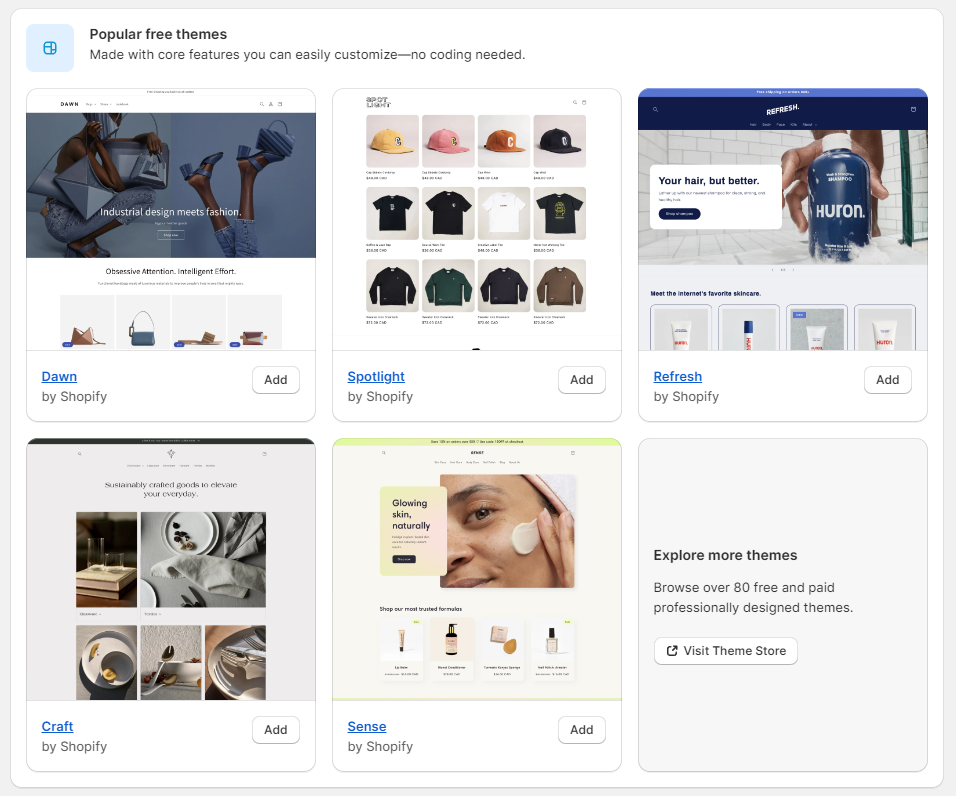
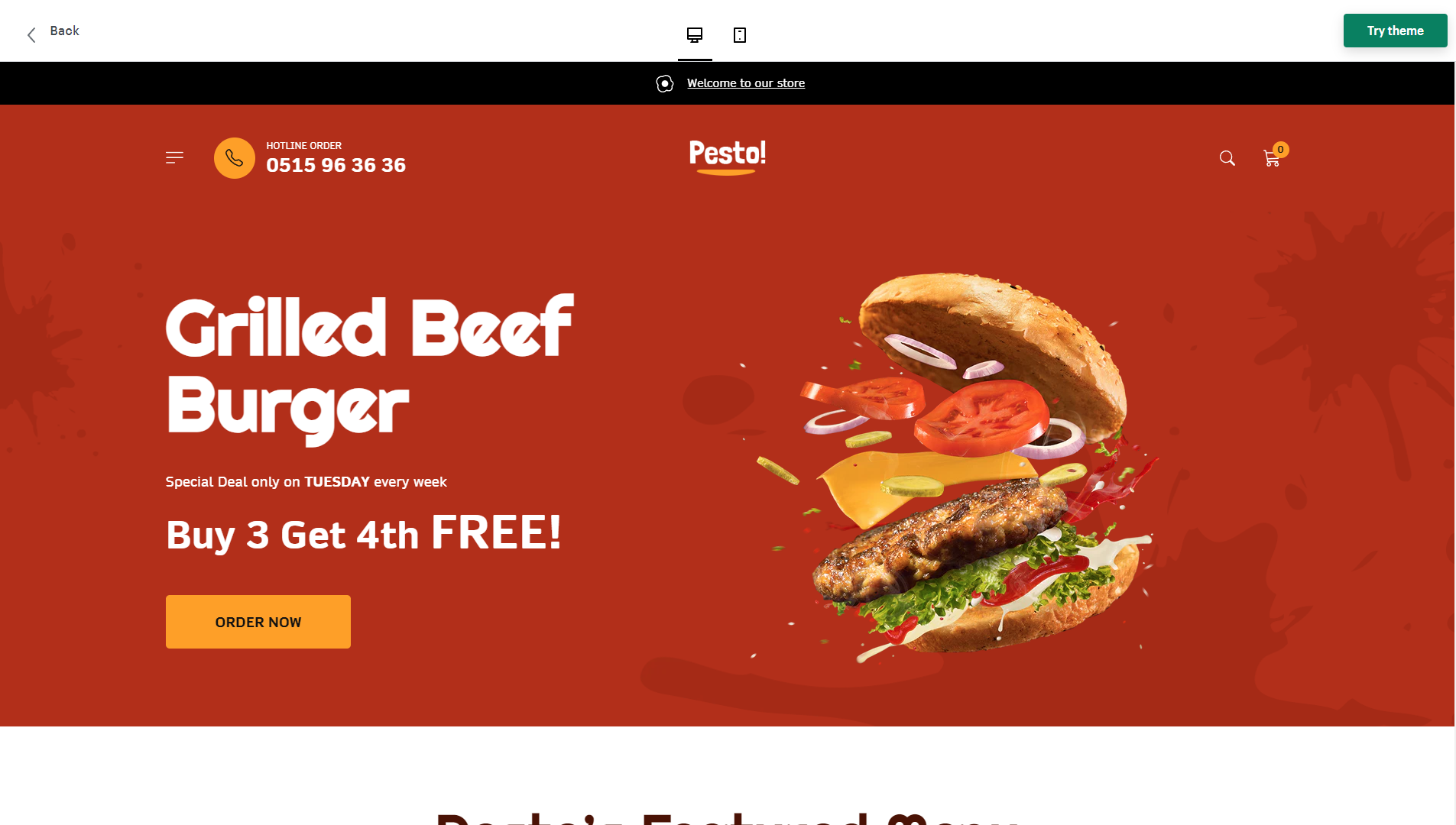
Compared to Shopify, Web.com offers over 100 website templates designed to cater to a broad spectrum of industries and personalization needs. These templates are structured to be straightforward in customization, allowing users to easily adapt their chosen designs to suit their unique brand identity through the platform’s editor. However, while the platform facilitates template customization and offers numerous pre-made layouts, it may not provide the most advanced features for all customization desires.
Get a head start on website creation with AI
Create a custom website tailored to your business needs 10X faster with 10Web AI Website Builder!
Ease of use
Ease of useReflects the platform’s overall user-friendliness.Score
Components:
- Learning curve (40%): Quickness and ease of getting started.
- Interface design (30%): Simplicity and intuitiveness of layout.
- User guidance (20%): Quality of tutorials and support.
- Flexibility (10%): Adaptability to various user skills.
 7.5
7.5
 6.4
6.4
🏆 Winner: Shopify
. Scoring a 7.5, Shopify is widely praised for its exceptional ease of use, offering a drag-and-drop interface, intuitive layout, pre-built templates, and extensive resources for beginners. Web.com, with a score of 6.4, offers a robust platform but with a steeper learning curve, especially for those new to website building. If ease of use is a priority, Shopify is the clear winner in this category.
Learning Resources
🏆 Winner: Shopify
. While both platforms offer solid learning resources, Shopify goes a step further with its wide array of detailed tutorials and active community forums, making it easier for users to learn and adapt.
For ecommerce
EcommerceMeasures the platform’s effectiveness in supporting online business activities.Score Components:
- Ecommerce themes and templates (20%): Variety and design of templates.
- Product management (25%): Ease of managing and organizing products.
- Payment options (25%): Variety and convenience of payment methods.
- Ecommerce features (20%): Features for managing an ecommerce store.
- Integration (10%): Compatibility with external e-commerce tools and services.
 9.2
9.2
 6.3
6.3
Shopify, with a score of 9.2, outperforms Web.com, which scores 6.3, in the ecommerce sector. Shopify’s comprehensive set of features, including advanced inventory management, multi-channel selling, and detailed analytics, make it a robust platform for online businesses. On the other hand, Web.com, while offering a suite of ecommerce features, has been noted for its complex setup process and limited template variety.

|

|
|
|---|---|---|
|
Ecommerce themes and templates |
8.2 |
5.5 |
|
Product page customization |
8.5 |
6.0 |
|
Payment processing and commissions |
8.8 |
6.5 |
|
POS capabilities |
8.1 |
4.0 |
|
Payment gateways |
9.5 |
7.0 |
|
Product numbers |
9.0 |
5.0 |
|
Additional ecommerce features |
9.1 |
6.0 |
Shopify ecommerce features:
- Comprehensive store builder
- Shopify Payments and other gateways
- Advanced inventory management
- Multi-channel selling
- Abandoned cart recovery
- Detailed analytics and reporting
Web.com ecommerce features:
- Product listing
- Marketing Features
- Shipping options
- Payment Gateways integration
Ecommerce themes & templates
Shopify offers about 150 modern responsive themes for creating a virtual storefront, ensuring a good look on both desktop and mobile devices. While some themes are free, others cost between $170 to $380. In contrast, Web.com provides around 15 ecommerce templates designed to help businesses quickly launch and customize their online stores. These templates are compatible with Web.com’s website builder, facilitating straightforward customization and integration for digital storefronts.
Product page customization
Shopify allows three options per product, totaling 100 unique variations. While Shopify offers titles, descriptions, and image galleries with zoom effects, customization options like adding ribbons, size charts, and wishlists are not as straightforward. However, Shopify distinguishes itself with additional features through its extensive library of extra apps, offering functionalities like reviews, Facebook stores, eBay item importers, and a unique Augmented Reality feature for an enhanced customer experience.
Web.com’s website builder offers a suite of tools for e-commerce stores, including product category management for organizing inventory and improving navigation, and product listing features for adding detailed product information and images. Users can create and manage product variants to accommodate items with multiple options, enhancing the customer shopping experience. The platform also supports various fulfillment types, allowing store owners to specify shipping or pickup options.
Payment processing
Shopify offers payments with typical charges of
2.9% + 30¢
per online transaction on basic plans, and lower fees for higher-tier plans. However, it adds extra fees for using other payment gateways. Shopify Payments is Shopify’s own payment processing gateway. It allows merchants to accept credit card payments directly on their store without having to integrate third-party payment providers. This simplifies the payment process, reduces transaction fees, and streamlines the handling of finances.
Web.com supports popular payment gateways like PayPal, Stripe, and all major debit and credit cards, ensuring a wide array of payment options for customers. Details on transaction commissions, particularly whether Web.com imposes additional fees on transactions processed through these gateways, were not clearly stated in the reviewed sources. Typically, the payment gateways themselves may charge transaction fees; however, the presence of any supplementary commissions from Web.com remains unspecified.
Website Editors
Website EditorsEvaluates the platforms’ website building and editing capabilities.Score Components:
- Customization tools (40%): Range and power of editing features.
- Editor usability (30%): User experience within the editor.
- Design flexibility (20%): Freedom in layout and design changes.
- Update and maintenance ease (10%): Simplicity of updating and maintaining the site.
 7.9
7.9
 6.6
6.6
🏆
Winner: Shopify
. Shopify’s editor, with a score of 7.9, excels in providing a streamlined, ecommerce-focused editing experience. It’s particularly beneficial for users who prioritize efficient management of online stores. The editor is straightforward, making it easy to add products, manage inventory, and set up payment methods. Shopify’s editor is optimized for sales and business growth, with built-in tools specifically designed for ecommerce businesses.
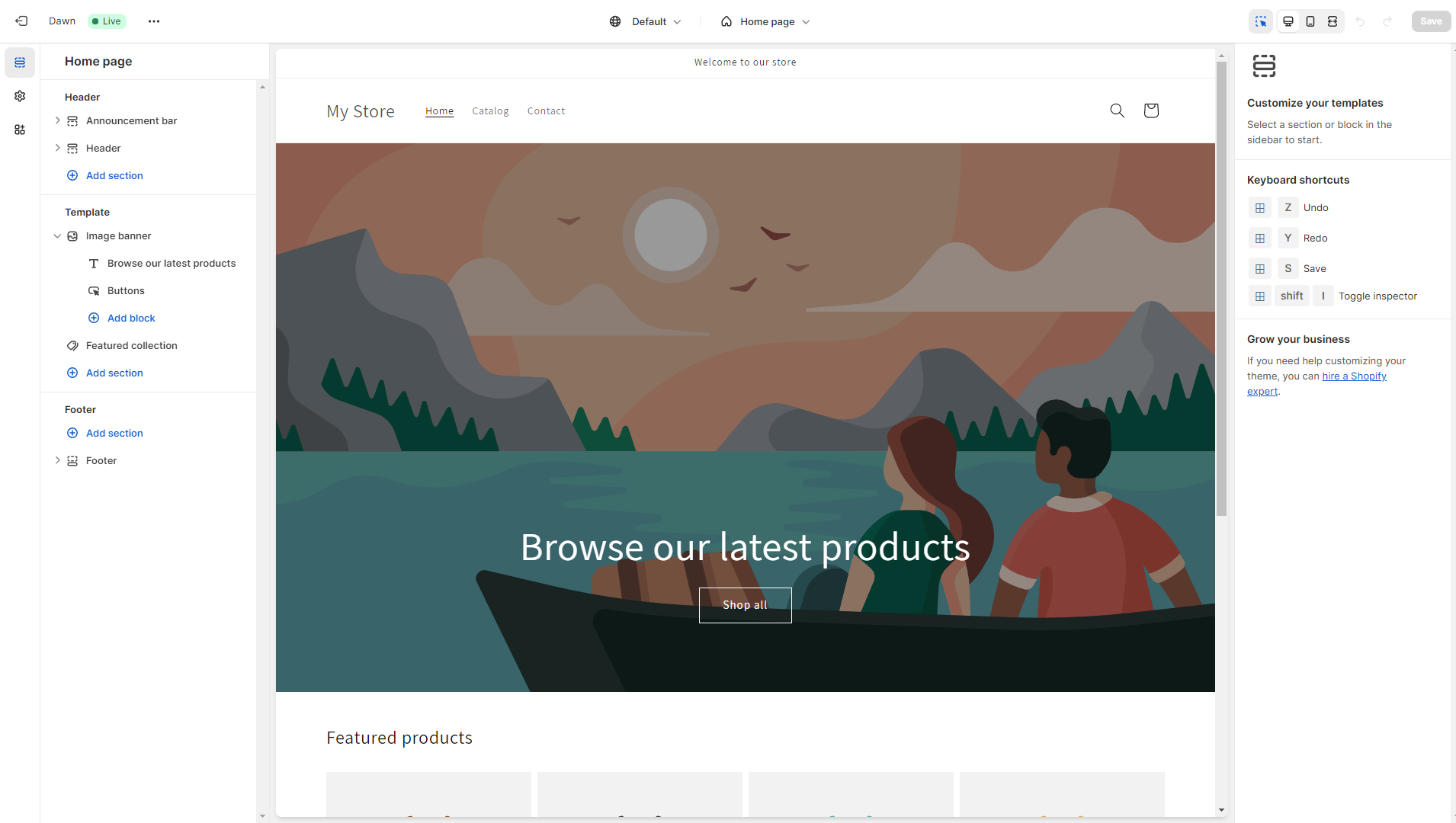
Web.com’s website builder, scoring 6.6, offers a user-friendly platform with a variety of templates and a drag-and-drop interface for easy customization. However, it has some creative limitations due to its row-based layout. It supports basic e-commerce capabilities suitable for small businesses, alongside features like analytics, social media integration, and email services. For more advanced functionalities like promotional pop-ups, calendars, or comprehensive blogging tools, the platform may fall short unless users are willing to add custom code.
Mobile editor/app
 8.0
8.0
 0
0
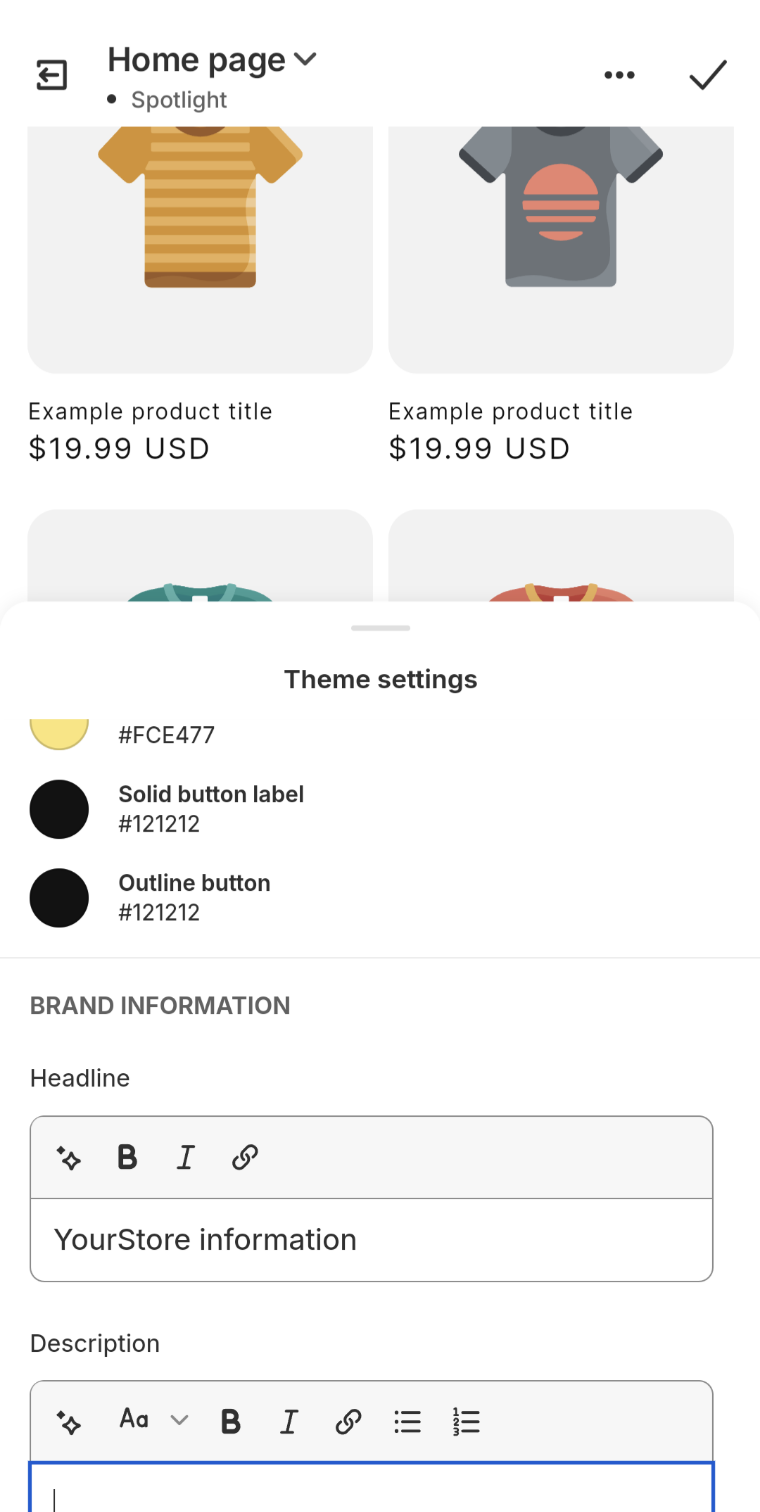
🏆
Winner: Shopify
. Shopify offers a mobile app that allows users to manage their online store from their mobile device. This feature enables the addition, removal, editing, and rearrangement of content on the store’s website, offering convenient on-the-go adjustments to the store’s appearance and layout.
On the other hand, Web.com does not have a dedicated mobile editor app. Therefore, if mobile editing is a priority for you, Shopify would be a better choice.
Product testing options
Product Testing OptionsAssesses the options for trying out platform features before commitment.Score Components:
- Trial quality (40%): Extent and usefulness of the trial or free version.
- Feature accessibility (30%): How many features are available to test.
- Trial duration (20%): Length of the trial period.
- Ease of transition (10%): Smoothness of moving from trial to paid plans.
 8.1
8.1
 0.2
0.2
Overall Result
:
Shopify Wins
. Shopify scores 8.1 in product testing options, significantly outperforming Web.com, which scores only 0.2. Shopify offers a 14-day free trial, allowing users to test all features, including premium ones. In contrast, Web.com does not offer a free trial or the possibility to test any features before purchasing a plan.

|

|
|
|---|---|---|
|
Free Plan |
No (14-day free trial) | No |
|
Trial Duration |
14 days | No trial available |
|
Testing Premium Features |
All features during free trial |
Not possible before purchasing a plan |
Price
PriceLooks at the cost-effectiveness and value for money of each platform.Score Components:
- Plan value (40%): What each pricing tier offers.
- Transparency and clarity (30%): Clearness of pricing structures.
- Flexibility of plans (20%): Range of options to suit different budgets.
- Hidden costs (10%): Additional expenses not included in the plan.
 8.2
8.2
 7.4
7.4
Shopify offers more value for money, with a higher price score and more features, especially for ecommerce. However, Web.com’s plans are cheaper and offer a high discount on annual billing.

|

|
|
|---|---|---|
|
$10-$20 |
No offering at this amount. |
Website ($19.99/month): AI-powered Website Builder. Free domain & domain privacy for 1 year. Professional email for 3 months. SSL Certificate for 1 month. 1 hour expert design support. Social & email marketing tools. Value for price: 6.5 |
|
$20-$30 |
Shopify Basic ($29/month): Unlimited products, 2.9% + 30¢ card fee with Shopify payments, Extra 2% gateway fee without Shopify Payments, Abandoned cart recovery, Automated sales tax, Digital products, POS Integration, 2 staff accounts. Value for price: 8.0 |
Website + Marketing ($24.99/month): All features in the Website plan. Enhanced marketing tools. Appointment scheduling. Value for price: 7.0 |
|
$30-$40 |
No offering at this amount. |
eCommerce ($34.99/month): All features in the Website + Marketing plan. Online store with secure checkout. Sell on multiple marketplaces like Facebook, Instagram, Amazon, eBay, etc. Value for price: 8.5 |
|
$70-$80 |
Shopify Standard ($79/month): Lower card fees (2.6% + 30¢), Gift cards, Professional reports, 5 staff accounts. Value for price: 8.5 |
No offering at this amount. |
|
$200+ |
Advanced Shopify ($299/month): Lowest card fees (2.49% + 30¢), Advanced report builder, Real-time carrier shipping, Up to 15 staff accounts Value for price: 8.8 |
No offering at this amount. |
location. As a result in rare cases the prices displayed here can differ from the ones you see on their
websites.
Hosting quality
Hosting
qualityExamines the reliability and performance of the hosting solutions.Score Components:
- Uptime (40%): Consistency and reliability of website availability.
- Speed (30%): Loading times and performance.
- Bandwidth and storage (20%): Sufficiency of resources provided.
- Data centers (10%): Quality and distribution of hosting infrastructure.
 9.0
9.0
 5.9
5.9
Winner: Shopify
. Shopify’s proprietary cloud-based hosting, 99.99% uptime guarantee, and five global data centers make it a superior choice for hosting. Web.com offers shared hosting but lacks transparency about uptime and data center locations, resulting in a lower rating.

|

|
|
|---|---|---|
|
Do they offer hosting? |
Yes, included in all paid plans |
Yes, with unlimited storage and daily backups |
|
Data Centers: |
5 globally: USA (Ashburn, Virginia; Santa Clara, California), Canada (Toronto, Ontario), Ireland (Dublin), and Singapore |
Web.com does not disclose the locations of its data centers |
|
Type of hosting: |
Proprietary cloud-based hosting |
Shared hosting |
|
Uptime: |
99.99% |
Web.com does not provide uptime statistics or guarantees |
|
Uptime Guarantee: |
Yes, 99.99% |
No |
Website Speed Optimization
Website Speed OptimizationEvaluates optimization of website loading timesScore Components:
- PageSpeed Score (30%): Google’s score indicating performance optimization.
- Loading Time (30%): The average time until a website is fully interactive.
- Mobile Optimization (15%): Optimization effectiveness for mobile devices.
- Resource Optimization (15%): Optimizing images, scripts, and other heavy resources.
- CDN Usage (10%): Use of CDN to enhance speed across geolocations.
 7.8
7.8
 5.8
5.8
🏆 Winner: Shopify
Both Shopify and Web.com place a high priority on website performance and page speed, with Shopify focusing on app efficiency and theme optimization, and Web.com emphasizing mobile optimized design, code minification, caching, and image optimization. However, Shopify gets the edge when it comes to website speed optimization.

|

|
|
|---|---|---|
|
Focus |
App efficiency, Theme optimization |
Mobile Optimized design, Code Minification, Caching, Image Optimization |
|
Performance Tools |
Google Lighthouse, PageSpeed Insights |
Not specified |
|
Key Strategies |
App efficiency, Theme optimization |
Mobile Optimized design, Code Minification, Caching, Image Optimization |
|
Load Times |
Varies widely, dependent on optimization |
Varies depending on optimization and website complexity |
|
Page Speed Scores Range |
Scores vary; influenced by apps, images |
Not specified |
|
Core Web Vitals Improvement |
Emphasis on LCP, FID, CLS improvements |
Not specified |
Shopify’s approach to enhancing site speed includes app optimization by removing unneeded app code, conditionally loading apps, avoiding immediate pop-up displays, and incorporating app functionality directly into themes. This approach leverages Shopify’s fast servers and CDN network to boost load speed. Shopify also suggests utilizing Google AMP for faster mobile page loads, although with some design compromises. Analysis of three Shopify sites showed a range of Shopify speed scores from 14 to 75, Google PSI scores from 8 to 80, and load times varying from 10.6 seconds to 2.3 seconds. Continuous maintenance and optimization are essential for keeping Shopify stores fast.
Web.com, on the other hand, emphasizes mobile optimized design, code minification, caching, and image optimization as their key strategies for speed optimization. However, they do not provide any specific information on their Core Web Vitals improvements or the range of their Page Speed Scores. Their load times and PageSpeed scores vary depending on optimization and website complexity.
Get a head start on website creation with AI
Create a custom website tailored to your business needs 10X faster with 10Web AI Website Builder!
Plugins and integrations
Plugins and integrationsMeasures the range and effectiveness of additional plugins and integrations.Score Components:
- Variety of options (40%): Range of available add-ons.
- Integration smoothness (30%): Ease of integrating plugins into the site.
- Quality of plugins (20%): Functionality and reliability of the options.
- Custom integration capabilities (10%): Support for custom or third-party integrations.
 8.7
8.7
 6.7
6.7
🏆 Winner: Shopify.
With a score of 8.7, Shopify outperforms Web.com, which scores 6.7 in plugins and integrations. Shopify offers over 8,000 apps in its App Store, covering a wide range of functionalities, while Web.com provides a suite of plugins and integrations for websites built on its platform. Shopify’s plugins enhance ecommerce by offering advanced sales, marketing, and payment options, among others. On the other hand, Web.com’s plugins expand the website builder’s basic functionality, enabling advanced eCommerce features, comprehensive SEO tools, and enhanced social media integration. However, Shopify’s extensive range of plugins and seamless integrations give it the upper hand.
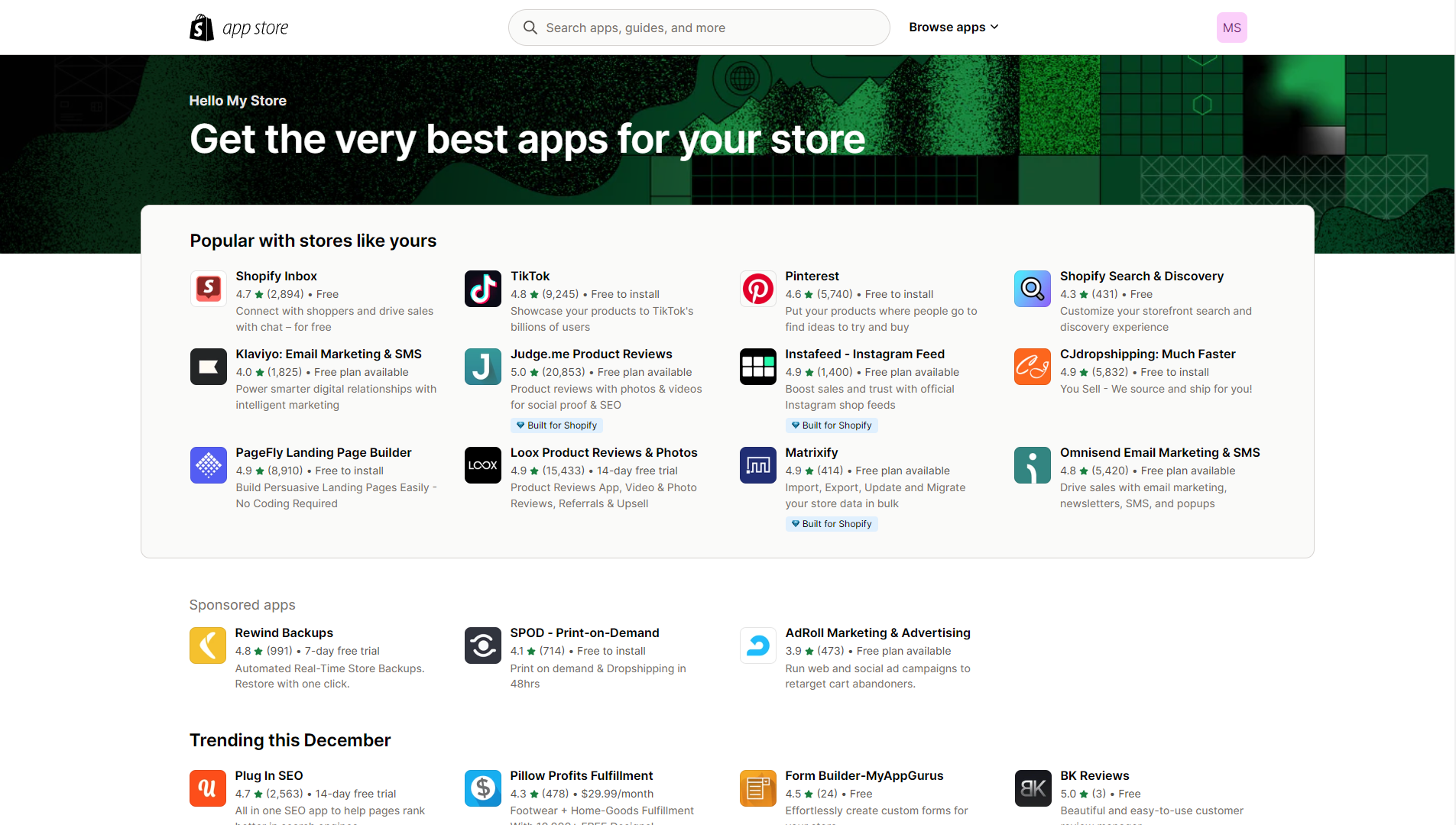
Marketing Features
Design FunctionalitiesRepresents how well each platform allows for creative design and customization of websites.Score Components:
- Template Variety (30%): Range and quality of design templates.
- Customization (30%): Flexibility and options for design alterations.
- User Interface (20%): Ease and intuitiveness of the design process.
- Responsiveness (10%): Adaptability to different devices and screen sizes.
- Innovation (10%): Unique design features and tools.
 8.8
8.8
 7.0
7.0
🏆
Overall Winner: Shopify
. Shopify stands out for its more advanced ecommerce-focused marketing tools, especially in analytics and ad campaign management. Web.com offers a decent range of marketing tools, but they are more basic compared to Shopify.

|

|
|
|---|---|---|
|
SEO Tools |
|
|
|
Email Marketing |
|
|
|
Blogging |
|
|
|
Social Media Integration |
Advanced integration for selling directly on social platforms |
Basic social media integration |
|
Analytics and Reporting |
Detailed analytics for in-depth insights |
Basic website analytics |
|
Ads and Promotions |
Google Ads integration; sophisticated ad campaign management |
Tiered selection of marketing tools across different packages |
Customer Support
Customer supportEvaluates the quality and availability of support options.Score Components:
- Response time (40%): Speed of support responses.
- Support quality (30%): Effectiveness and helpfulness of the support.
- Availability (20%): Range of support channels (phone, chat, email).
- Resource richness (10%): Quality of self-help and educational materials.
 8.6
8.6
 7.3
7.3
🏆 Winner: Shopify
. Shopify outperforms Web.com in this category with a customer support score of 8.6 compared to Web.com’s 7.3. Shopify provides 24/7 support through chat, email, and phone. The tutorials are typically clear and beneficial, and the extensive community ensures that answers can be found in the numerous forum threads. Additionally, Shopify’s outstanding marketing blog offers valuable information on business growth strategies. For enterprise-level businesses, Shopify steps up its support game with a dedicated program and additional resources to ensure your success.
Web.com offers comprehensive customer support for its users, providing assistance through various channels to ensure you can find help whenever you need it. Their support includes email, live chat, and phone support, available 24/7. The recommended option for getting in touch is the 24/7 phone line, which is free with all plans. This service aims to offer prompt and direct assistance, making it a reliable option for immediate support needs. However, Web.com does not have customer support for enterprises.
Security
SecurityLooks at the platforms’ security measures and data protection.Score Components:
- Data protection (40%): Safeguards for user and customer data.
- SSL and encryption (30%): Implementation of secure connections.
- Compliance (20%): Adherence to industry security standards.
- Regular updates (10%): Frequency of security updates and patches.
 9.0
9.0
 7.6
7.6
🏆
Winner: Shopify
. Shopify’s security measures are comprehensive, including secure infrastructure, encryption, limited access, two-factor authentication, regular audits, and a dedicated incident response team. Shopify’s focus on security is especially important for ecommerce sites dealing with sensitive customer data.
Web.com, on the other hand, offers security measures through its partnership with SiteLock Security, providing services like malware scans, automatic malware removal, blacklist monitoring, and DDoS protection. However, compared to Shopify, Web.com’s security features are less comprehensive.
AI Capabilities
AI capabilitiesMeasures the effectiveness of AI-driven features and tools.Score Components:
- Automation efficiency (40%): Impact of AI on streamlining processes.
- Personalization (30%): AI-driven customization for users or customers.
- AI-Assisted design (20%): Role of AI in website design and functionality.
- Data analysis (10%): Use of AI in interpreting user data and analytics.
 7.9
7.9
 7.3
7.3

|

|
|
|---|---|---|
|
Personalized Design |
|
Web.com’s AI builder offers personalized design suggestions |
|
SEO Optimization |
AI-driven recommendations for better search engine visibility |
|
|
Customer Behavior Analysis |
Advanced analytics to understand customer preferences |
|
|
Sales Predictions |
AI-powered sales forecasting tools |
|
|
Inventory Management |
AI tools to assist in efficient inventory handling |
AI-driven inventory management tools |
|
Content Generation |
AI-assisted content creation |
AI Writer for versatile content creation |
🏆 Winner: Shopify
. Shopify, with a score of 7.9, utilizes AI mainly to enhance the ecommerce experience. Its AI features focus on customer behavior analysis, personalized shopping experiences, inventory management, and sales predictions. While Shopify’s AI is powerful, it is more business and data-centric compared to Web.com’s design-focused AI.
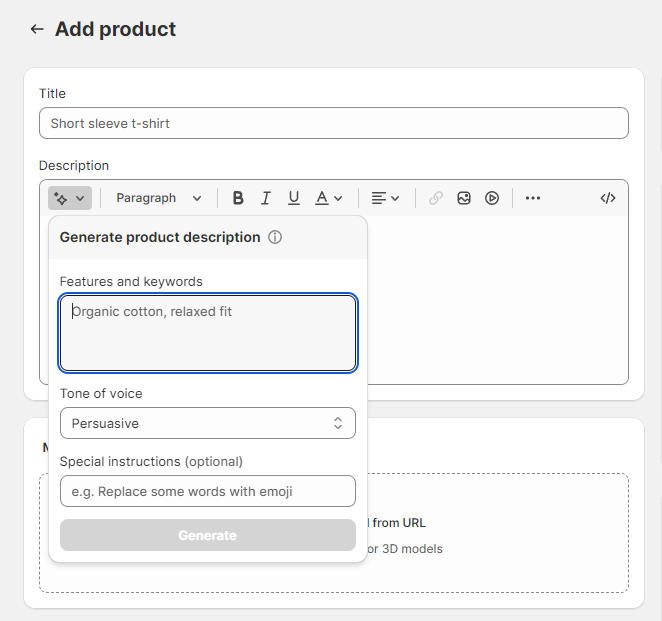
Web.com, scoring 7.3, offers an AI website builder that simplifies the website creation process. It provides personalized design suggestions and an AI Writer for versatile content creation. However, it lacks in providing AI-driven SEO recommendations and sales predictions.
User Management
User ManagementAssesses the platforms’ capabilities in managing user roles, permissions, and accessibility.Score Components:
- Role Customization (40%): Flexibility in creating and defining user roles and
permissions. - Ease of Management (30%): User interface and tools for managing users.
- Access Control (20%): Effectiveness of access control measures for different user
levels. - Scalability (10%): Ability to manage a growing number of users efficiently.
 6.5
6.5
 5.2
5.2
🏆 Winner: Shopify
. Managing your online team with Shopify and Web.com involves different approaches to website editing access.
-
Shopify enforces staff account limits based on plans, ranging from 2 to 15, with Shopify Plus offering unlimited
accounts. Collaborators with limited access are also an option. - Web.com allows multiple user accounts, however the platform does not specify how many accounts are supported.
Both platforms support simultaneous editing. Shopify uses avatar icons to indicate co-workers, while Web.com does not provide information on how it handles concurrent editing.
Shopify User Roles and Access Levels:
| Role | Description | Access Highlights |
|---|---|---|
| Store Owner | Full control over store | Manage products, orders, discounts, payments, apps, settings. Create and manage staff accounts. |
| Staff | Configurable access by owner |
Add/edit products, manage orders, fulfill orders, manage customers, update content. Access level can be customized by the owner. |
| Collaborator | Limited access for external partners | View and manage specific sections like blog or product categories. Cannot access full store settings. |
Web.com User Roles and Access Levels:
| Role | Description | Access Highlights |
|---|---|---|
| Primary | The main account holder or primary user. | Edit primary user info Purchase products Manage and renew products and services |
| Admin | Users with administrative privileges besides the primary. | Edit payment information Add/Edit/Delete user roles Manage and renew products and services Edit WHOIS Admin and Tech user info |
| Tech | Users with technical responsibilities. | Manage and renew products and services Edit WHOIS Admin and Tech user info |
Additional Features

|

|
|
|---|---|---|
|
SSL Certificate |
|
|
|
Custom Domain |
|
|
|
Free Custom Domain Included |
|
|
|
International Domains |
|
|
|
Mobile Responsive |
|
|
|
Page Speed |
|
|
|
Website Builder Mobile App |
|
|
|
Convert a Website To An App |
|
|
|
Website Analytics |
|
|
|
Multilingual Sites |
|
|
|
Multiple Users |
|
|
User Feedback
Shopify’s user feedback is generally positive, with a rating of 4.4/5 based on 4482 reviews on G2 Crowd. Users often highlight Shopify’s specialization in ecommerce, its comprehensive features, ease of use, and robust customer support. These aspects cater specifically to online businesses, leading to high user satisfaction among those seeking a dedicated ecommerce solution.
Unfortunately, there is no user feedback summary available for Web.com, and it is not listed on the G2 platform. Therefore, a direct comparison of user feedback between Shopify and Web.com is not possible at this time.
The making of this blog
We followed a clear, step-by-step process to write and research this article.
FAQ
Which platform is better for ecommerce, Shopify or Web.com?
Can I use Shopify and Web.com for building informational business websites?
How do Shopify and Web.com compare in terms of ease of use?
What are the pricing differences between Shopify and Web.com?
Which platform offers better hosting quality?
Are there any differences in website speed optimization between Shopify and Web.com?
How do the platforms compare in terms of plugins and integrations?
Which platform has better customer support?
How do Shopify and Web.com compare in terms of security features?
What AI capabilities do Shopify and Web.com offer?










